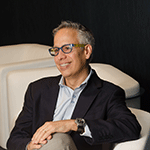He may not wear his engineering degree on his sleeve, but patent attorney Michael Rodriguez has one. He might not speak often of his time in Iraq, but it was there that he oversaw 100 troops for the US Navy. He doesn’t usually display the athleticism and skill that made him a favorite with baseball scouts back in high school, but there was a time that baseball might have been his ticket to success. Rodriguez’s background is made up of all these experiences, and while they fit in nicely with his ongoing success in law (he’s been a partner at Munck Wilson Mandala, LLP in Dallas since 2008), they make him an exception to the rule back in his hometown of El Paso, TX. A rather significant exception when he thinks of all his Hispanic peers (including three of his four older brothers) who went no further academically than a couple years at a community college.

“I wish I wasn’t the anomaly,” Rodriguez laments, “because we’re all capable of it.” Which is why he visits Hispanic-dominant schools on a regular basis. “I especially love going to elementary schools,” he says. “I tell Hispanic kids, ‘You can achieve whatever you wish, and I’m living proof of that.’”
When Rodriguez was a child, an engineer visited one of his classes. As a kid who thrived on taking things apart and figuring out what made them work, he connected instantly and set his mind to a career in engineering. “The idea of something I couldn’t see, powering so many things fascinated me,” he says.
But Rodriguez was equally set on playing baseball. By his sophomore year of high school, he was already on the varsity team. Talent scouts started chatting up his father, and the possibilities became dazzling. “The ego in me was like, ‘Wow, I could do this,’” recalls Rodriguez. “I’d say, ‘Think of it, Dad. I could maybe play for the Yankees someday!’ But then my father would say ‘Or, you could play college ball first, then play for the Yankees,’” Rodriguez remembers. His father had a way of bringing him back to Earth, quickly.
Though the passing of Rodriguez’s uncle, a professional baseball player and mentor to his nephew, led to him stepping away from the sport his senior year, he was eager to return to it when he started at Texas A&M University on an academic scholarship. But during a practice game prior to tryouts, things didn’t go quite as planned.
Rodriguez was trying to improve the speed at which he moved the ball from his catcher’s mitt to his hand. On one pitch, he turned the glove a little too soon, and a fast one hit him straight in the hand. His immediate thought was that he’d just jammed a finger. He tried to shake it free but couldn’t hold the ball very well anymore. X-rays showed his hand was effectively shattered. Any shot at a professional career was over. So Rodriguez set his sights on his other first love. “I pursued my engineering degree at A&M, gave up baseball, and just focused on being a good student,” he says.
Around the same time baseball was leaving his life, though, the military was entering it. His father had served in the Marines, so when the Navy pursued Rodriguez with an opportunity to fly jets once he finished school, he was on board—until his father was diagnosed with Parkinson’s around the time of his Rodriguez’s graduation in 1991. Navy plans were tabled while he worked as an engineer, sending money home regularly.
The military life was never far from sight, though. When 9/11 occurred a decade later, Rodriguez joined the Navy Reserve in an engineering capacity, so he could continue his education until he was absolutely needed. He earned his juris doctorate in May 2005, and, as fate would have it, he was deployed to Iraq the day after he took the bar exam—one of a number of times his military career intersected directly with his civilian life before he shifted to inactive
reserve status in 2013.
At Munck Wilson Mandala, where Rodriguez has practiced in all areas of intellectual property since 2008, he pays special attention to patent and trademark protection and prosecution. He finds that he is continually making innovative discoveries having to do with engineering elements. “There have been interviews (with clients) when I’ve just stood back and thought how amazing it is that I’m able to apply both a legal education and an engineering degree to succeed in the way that 10-year-old kid in El Paso could only dream of,” Rodriguez marvels.

